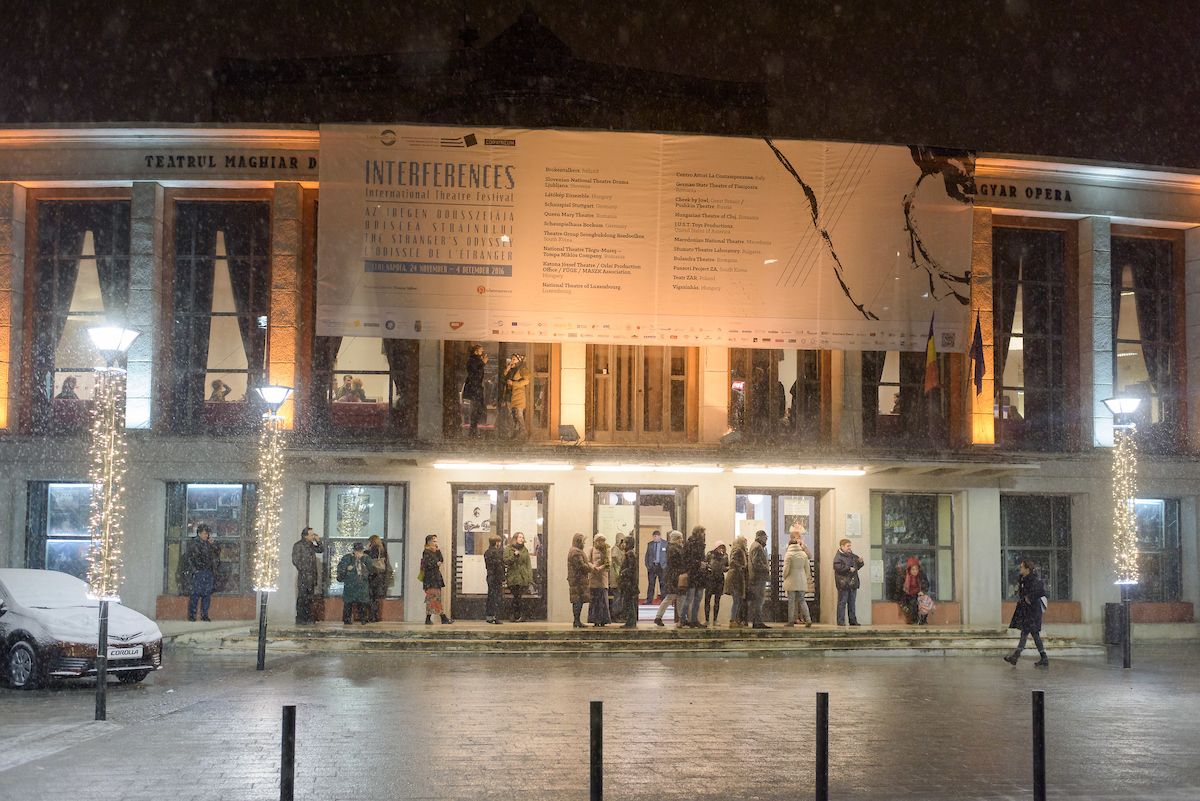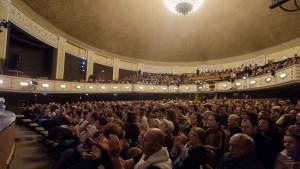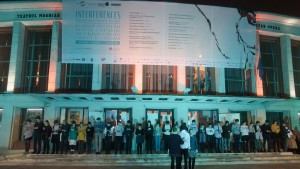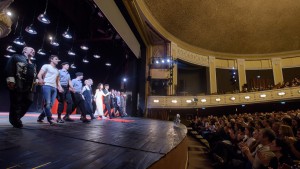In the stranger, I recognize myself
“Az idegen Odüsszeiája” — “The Stranger’s Odyssey” is the title of this year’s “Interferences” Festival at the Hungarian Theatre of Cluj that wishes to explore the theme of strangeness.

It is my conviction that most of the performances (aiming at the creation of aesthetic value) can be easily interpreted in the conceptual framework of strangeness. Moreover, the festival itself as a border context — whether at home or abroad — makes this topic intensely thought-provoking.
In other words, the topic of strangeness is perhaps a bit too self-evident to discuss in relation to theatrical performances — and yet it proved to be an intriguing intellectual “carrot” for me after spending three or four days at the festival: and not only through the performances, but also in connection with my unique and special position. Theatrical writers in Hungary try to follow Hungarian theatre events in Romania (even if not with the desirable and necessary intensity, which is mainly due to financial reasons), so I run into a lot of colleagues. But this time, I’m standing out a bit from this somewhat complex and conflictual Hungarian/transborder Hungarian relation: since I’m attending the festival in the framework of a meeting organized by the UTE (Union des Théâtres de l’Europe) for journalists, I mostly walk the streets with Italian, Czech, Greek, or Bulgarian colleagues, talking about performances and theatrical structures. Perhaps never have I ever attached nationalities to names so firmly as now when the explanation of my “Hungarianness” calls for interesting supplements, when I am halfway between the guest and the host, the strangers and the locals..
Maybe partly due to that, I am a bit more restrained: I feel less tempted to hold “informal” introductions before the Hungarian-language performances as I would usually do. (That is how it could happen that I had already discussed all the bits and pieces of a performance with a colleague when he suddenly had a revelation: but of course, the piece was played in my mother tongue.) It is hard to decide whether this restraint is caused by a sort of laziness, or that I would like to see the performances, my opinion as a critic, the theatre I can associate with weighed without the “active involvement” of my Hungarianness.
The performance I was referring to above was Hullámtörés (“Breaking of the Waves”) by the troop of Cluj-Napoca: it was a pleasant mixture of the familiar and the alien.
I feel at ease in the language, but I must admit that even after so many years’ of working as a critic, the “transborderness” of a performance still has a special flavour to me. (I do not think it is simply the paternalistic goodwill of those coming from the mother-country; on the contrary, sometimes it is in the light of transborder performances that I see the theatre of Hungary as provincial.) The play’s antecedents, a film by Lars von Trier is also familiar to me, so I can easily lose myself in the interpretation of the actors (Anikó Pethő and Ervin Szűcs, the two protagonists are the equals of Emily Watson and Stellan Skarsgård, but fortunately they do not want to compete with them; one cannot smell the sweat of the effort.) I also find it exciting that the performance itself reflects on the fact of adaptation: how inspiring the differences between the two media can actually be. For instance, in the scene when Bess is brutally raped, it is a male actor who plays the female protagonist’s role, using utterly exaggerated and ridiculous gestures imitating a woman’s whining — as an indication that while this kind of episode goes down well in a film, it simply would not work in a realistic theatrical framework. It is all the more frightening when the same male actor starts howling in a manly way — trying to stop the game and the sailors —; it is only then that I suddenly become aware of Bess’s vulnerability. Later on, the performance “re-enacts” this scene impressively: this time with Bess, seen from a distance, with darkness, camera and music.
My colleagues (with one exception) did not like this performance. Strangely enough, we cite the same arguments in favour of the performance as against it; we forgive the same nuances or consider them unforgivable. It is not for the first time that the idea haunts me that first an impression is formed within the critic, and it is only then that we look for arguments to support that; not that I have ever thought that being a critic has anything to do with being objective and exact.
We all agree about the performance of Vígszínház from Budapest (Jó embert keresünk – The Good Man of Seciuan): none of us considers it especially exciting, but rather as a series of sensationalist theatrical solutions at the most. I must confess this is the first time that I have seen this performance, and my “suspicion” regarding the big stage and the people’s theatre efforts of Vígszínház in general cannot be washed out, not even by the enthusiasm of the public celebrating Enikő Eszenyi, the renowned actress.
It is the Stranger’s Song, a performance by the South Korean Pansori Project ZA that convinces me that we are watching a theatre here and now that starts out with similar chances for everyone, without having to overcome any prejudice. This performance adapts a short story by Márquez about immigrants from the Caribbean who live in Geneva; and what is more, it is embedded in the tradition of phansori, the Korean folk opera. In other words, it is the western narrative tradition that renders softer and more digestible whatever is strange or exotic in the Stranger’s Song. If there is a performance that is suitable for an international festival, it is this one.
While I enjoy every minute of it, perhaps I also resent that something should meet my expectations to such an extent even though one cannot feel the rigidity of the compulsion to conform — but it is undeniable that the strangeness and the familiarity are weighed out on precision scales. Isn’t it self-deception that makes this performance work? That it lulls us into believing that we are getting to know something new, distant and beautiful while whatever is strange in it reaches us to the smallest extent? Am I not more pleased by recognizing myself in it (as a European, as a Westerner) than by watching the strange (which is much less strange due to the above)? Do we pay attention and if yes, how much, to the drummer (Hyang Ha Lee), who can play her simple-looking instrument in a multitude of ways, and who seems to be expressing her disbelief or disapproval, or highlighting key sentences with cries?
I ask Patrice Pavis: is it globalization or universal humanness that cements this performance? I want the latter to be true, and Lee Jaram is a performer who makes me believe that, indeed; just like she can make me believe that there is some kind of universal humanness in theatre in general.
Published on 19 December 2017 (Article originally written in Hungarian)



